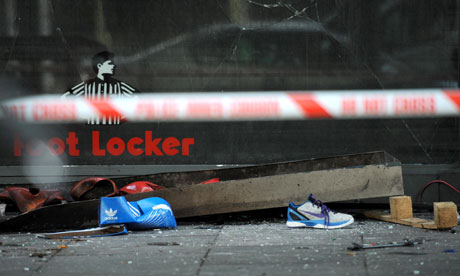Looting ‘fuelled by social exclusion’
Alexandra Topping
London Guardian
Aug 9, 2011

Looters found ways to justify their actions, Pitts added. “They feel they can rationalise it by targeting big corporations. There is a sense that the companies have lots of money, while they have very little.” Combined with a lack of intervention from police and increasing lawlessness, the combination was explosive: ” [Looters] quickly see that police cannot control the situation, which leads to a sort of adrenalin-fuelled euphoria – suddenly you are in control and there is nothing anyone can do.”
A generation bred on a diet of excessive consumerism and bombarded by advertising had been unleashed, he added. “Where we used to be defined by what we did, now we are defined by what we buy. These big stores are in the business of tempting [the consumer] and then suddenly these people find they can just walk into the shop and have it all.”
One eyewitness, who asked not to be named, said a police officer patrolling Brixton Road on Monday morning told him he thought 12-year-olds were looting.
Dr Paul Bagguley, a sociologist at the University of Leeds, said looting was a common feature of most riots but a mixture of practical reasons could have increased its extent. Rising unemployment was important not only as a catalyst of unrest, but because it meant more people were unoccupied on the streets leading to “biographical availability”. “It’s a straightforward argument, but powerful. Without jobs people are more likely to be hanging around the streets. Also there are simply more desirable, portable consumer goods to steal than ever before.”
The Emergency Election Sale is now live! Get 30% to 60% off our most popular products today!


